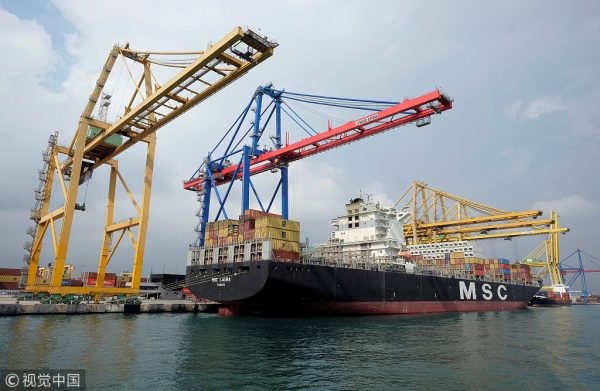
In 2017, logistics giant COSCO took over 51% of Noatum Port Holdings
Chinese logistics giant COSCO Shipping, which acquired 51 percent of Spain’s Noatum Port Holdings in a reported $228 million deal in November, is helping Spanish shipping grow with advanced know-how thanks to the vision of the Belt and Road Initiative.
Noatum operates maritime port terminals to handle containers in Valencia, on the eastern, Mediterranean coast, and in Bilbao, on the Atlantic Ocean in northern Spain. There also are railway terminals in Zaragoza, between Valencia and Bilbao, and in the capital, Madrid. The headquarters of Noatum, founded in 2001, is in Valencia.
From January to July, the company handled 2.08 million TEUs (a standard, 20-foot equivalent unit), an annual increase of 13.2 percent. In May, the containers handled set a monthly record of 325,969 TEUs, which also was an increase of 12.88 percent over the previous May.
“China has accumulated abundant management experience to run container terminals. Seven out of the top 10 container terminals (in annual volume) are in China. We are confident in managing the port,” said Sun Kai, CEO of Noatum Ports.
He attributed the increase to advanced management and a change in culture at the company.
In accordance with the management philosophy used to run modern ports, Sun introduced a flat organizational structure to reduce layers of middle management, improving efficiency.
“COSCO Shipping’s philosophy is cost-effectiveness. … Noatum Ports is following it,” he said.
The company has created an operations department to increase efficiency at the two ports and two rail subsidiaries. A new health, security and safety department reflects COSCO Shipping’s emphasis on safety, Sun said.
Sun worked at Greece’s COSCO-managed Piraeus Port for five years and has a lot of experience with port management. He said they will focus first on improving traffic volume and then develop intermodal transport services-smoothly moving containers between different modes of transportation-to turn their facilities into hubs offering comprehensive services.
That type of operation will enable the company to fully “take advantage of the economic benefit from northern Spain”, he said. “It will take time. We have just started, and the priority is to build a team and establish our corporate cohesion.”
Sun said that if the company can offer a promising future, employees will be inspired and loyal. He expects the company will handle 3.7 million TEUs this year, which after last year’s 3.3 million TEUs would be a more than 12 percent increase.
Juan Orti Llatas, commercial and business development director for Noatum Ports, said local employees are happy with the new management. “In a company, when the future is bright, you should be happy,” he said.
Orti, from Valencia, spent years working for a South Korean shipping company before joining Noatum Ports a year ago. He sees himself as a link between Eastern and Western culture.
“At first employees need to adapt to the new culture. But we Spanish people are open-minded, and employees here are very professional. … Ninety-five percent of our employees are already getting used to the change, and the rest of them will soon adapt to it,” he said.
As of July 31, the company had 415 employees-three are from China and the remainder locals. The company also hired all locals for 1,000 outsourced jobs.
Sun is keeping a tight rein on expenses with detailed management measures. He said one example is that their office used to have only one control for the air conditioner. “If one employee worked overtime, the whole office’s air conditioner was on,” which, he said, was a huge waste. So he put in three controls for different sections. “It ensures (comfort in) the employee’s work environment, and also saves money for the company.”
Noatum operates the largest container terminal at the Port of Valencia. The port handled a total of 4.83 million TEUs last year, making it the largest container terminal in the Mediterranean and the fifth-largest port in Europe, port officials said.
The Port of Valencia is a main gateway to the Iberian Peninsula and a natural port for Madrid. Its exports include marble, wine, beer, juice and olive oil and its main imports include mechanical equipment, furniture and electronic appliances.
The area within a 350-kilometer radius of Valencia contributes more than 55 percent of Spain’s GDP.
The company has the only container terminal at the Port of Bilbao, and 99 percent of its cargo serves local areas. It is a gateway to the Iberian Peninsula and southern France.
Two railway terminals can improve intermodal transport to link the coastal areas and the interior, company officials said.


